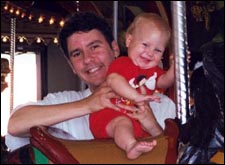Chicago Daily Law Bulletin
Volume 145, No. 151
Page 0001
Wednesday, August 4, 1999
A career milestone comes early to one Chicago lawyer
by MARTHA NEIL Law Bulletin staff writer

When clients are introduced to the managing partner at Banner & Witcoff, Ltd., they sometimes do a double-take.
That’s not surprising. Although he’s been president of the 75-lawyer intellectual property boutique’s board of directors since February, Marc S. Cooperman looks young enough to be an associate.
At 34, he may be the youngest attorney in the city to head an established law firm, observers say-but members of his peer group may have cause for optimism.
“There is definitely a trend toward younger managing partners,” says Joel F. Henning, a senior vice president and general counsel with the Hildebrandt International consulting firm. However, “thirty-four is young even among the new crop,” he said, noting that “I can’t offhand think of anybody that young” in the top job at another Chicago firm.
“The folks I know who are doing it are in their 40s and 50s, so I think this is a break with tradition,” agreed Kenneth R. Gaines, the managing partner of Altheimer & Gray.
But “he’s going to get old fast, that’s my observation,” Gaines said of Cooperman, now that he has the top job at Banner & Witcoff. “I hope he lives to my age, which is 56.”
The impression of Cooperman’s youth is heightened by his decorating preferences and personal style.
On first acquaintance Cooperman gives the impression of being a calm, easy-going, genuinely nice guy who doesn’t stand on ceremony. He works in a corner office where Disney-cartoon cells of Pinocchio, Tigger and Pooh hang on the wall, reflecting his personal taste. Beanie Babies and other beanbag figures from copyright and trademark infringement cases adorn his desk.
And Cooperman is fully in compliance with the firm’s new all-day, every-day casual dress policy, instituted at the beginning of the year after he became president. On a recent work day, he was attired in a purple polo shirt, khaki pants and Topsiders. A fluorescent yellow Bug’s Life Band-Aid was wrapped around a minor wound on one finger.
Casual dress is not required, and attorneys are free to wear business suits if they wish. Cooperman believes, though, that lawyers and staff are generally more comfortable-and work more productively and, hence, profitably-in casual clothes.
For this and other reasons, “people like working here,” he asserts. “They truly like to get up in the morning and come to work here.”
As with a number of other decisions made by a managing partner, the new casual-dress policy hasn’t been popular with everyone at the firm, Cooperman noted. “I’ve had a number of our attorneys come into my office and close the door and say, ‘That’s just not appropriate,’” he said of the policy.
The firm benefits from having a young managing partner, Cooperman believes, because he focuses on the likely long-term results of his decisions. At this point, he expects to be at Banner & Witcoff for decades before retiring.
More important than the age of the attorney in charge of a law firm is his or her managerial skills, though, those interviewed for this article agreed.
There are both advantages and disadvantages of having a young partner at the head of a firm, Henning says.
“It’s a very hard job, and the younger partners might better understand, these days, the importance of technology and the likelihood of having to deal with lots of lateral moves among lawyers and the idiosyncracies of Generation X lawyers that they have to deal with, since they’re Generation X themselves. Those would be some pluses,” Henning said.
The major minus would be that they might find it difficult to manage the 800-pound gorillas in the firm. What I advise my clients, when they’re putting in a real junior managing partner, is to make sure he or she is fully supported by an executive committee that can hold the 800-pound gorillas accountable.”
Gaines said “there’s no age requirement for this job,” citing “energy, a strong stomach and a thick hide” as some of the prerequisites.
Indeed, youth could be an advantage, he continued. “Our world is changing more rapidly than it ever has before, and it is possible to get out of touch – and age can have something to do with that. So a relatively youthful perspective in a quickly changing world is not a bad thing – although there’s much to be said for the wisdom that comes with experience, if you can adapt.”
Cooperman admits that one of the drawbacks of his job is “dealing with complaints about everything under the sun, from clients and lawyers, telling you, ‘You’re the managing partner, the faucet’s dripping.’”
At such times, he says, he’s thinking – and sometimes even says – “C’mon, get a life!” or “Don’t bug me with that!”
Cooperman’s bluntness and rapid-fire response, though, are important tools for getting things done at the firm, his fellow shareholders say.
“Very organized and hard-hitting,” Cooperman “does not like things to sit around,” says Pamela I. Banner, a shareholder in the firm’s Washington, D.C., office and a daughter of the founding lawyer of the same name.
The moment Cooperman saw a recent e-mail from her, for instance, recommending a particular approach to solving a computer system problem, he immediately responded and gave his approval, Banner said. “He got it, he read it – boom, he responded.”
However, Cooperman “doesn’t just rubber-stamp” proposals. If he thinks more information is needed, he can come back just as quickly with questions instead of a decision, Banner continued.
“He’s willing to say the unvarnished facts… which I think is a little unusual in a younger person,” said Charles W. Shifley, a shareholder who sits on the firm’s board of directors. “He is not at all difficult in his relationship with the other lawyers around the office, but he’s not at all deferential in his willingness to wade in the deal with tough subjects and say things that need to get said.”
For instance, he and Cooperman needed to speak to one of the firm’s shareholders recently because he wasn’t productive enough, said Shifley – who can recall a time when Cooperman, as a young associate, was reluctant to take his first deposition because he felt he lacked the experience to do so.
Leaving the meeting with the unproductive attorney, “he came away saying, ‘Well, that’s a first,’ and was very concerned about it,” Shifley said of Cooperman. “And yet, at the same time, he stepped right in and did it.”
Another drawback of his new role is the amount of time that being managing partner takes away from his practice. Presently, he spends about half of his time at the office on management duties, Cooperman said. But he expects that to improve, and hopes eventually to get back to “almost full-time” practice.
A 1989 graduate of the University of Illinois College of Law, Cooperman has spent his entire legal career at Banner & Witcoff. He became a junior partner in 1994, and was made an equity partner in 1998.
Married, with three young children, he commutes to the office from his home in Warrenville, just west of Wheaton. Meanwhile his wife – who is also an attorney – maintains a small real estate practice at home.
One of Cooperman’s hallmarks as the firm’s president has been bringing his young children – and inviting clients to bring theirs – to firm events that traditionally included only adults, Shifley noted. “I don’t know what other lawyers think,” he said of this practice, “but I think it’s great.”
Cooperman’s big move into firm management wasn’t really his assumption of the presidency, but his initial selection as a member of the firm’s seven-lawyer board of directors, back in 1997. The firm was going through some changes at the time, and its shareholders – all of whom vote to elect its governing body – decided it would be good to get more young blood on the firm’s board.
“I think that was definitely the primary stepping-stone,” Cooperman said.
Who will serve as president is determined by the board itself. And while Cooperman sets day-to-day policy, the full board actively manages the firm’s affairs.
“We have a very interactive board and a very involved board,” Shifley said, noting that it’s easier for a board to be involved in this way in the age of e-mail. “Marc has had to be very active with us, and has done it fairly well. I don’t think he’s yet taken off, in a sense of what he can do such that all he really needs to do is get our approval after the fact.”
Reprinted with the permission of Law Bulletin Publishing Company, August, 1999.
Posted: August 4, 1999


